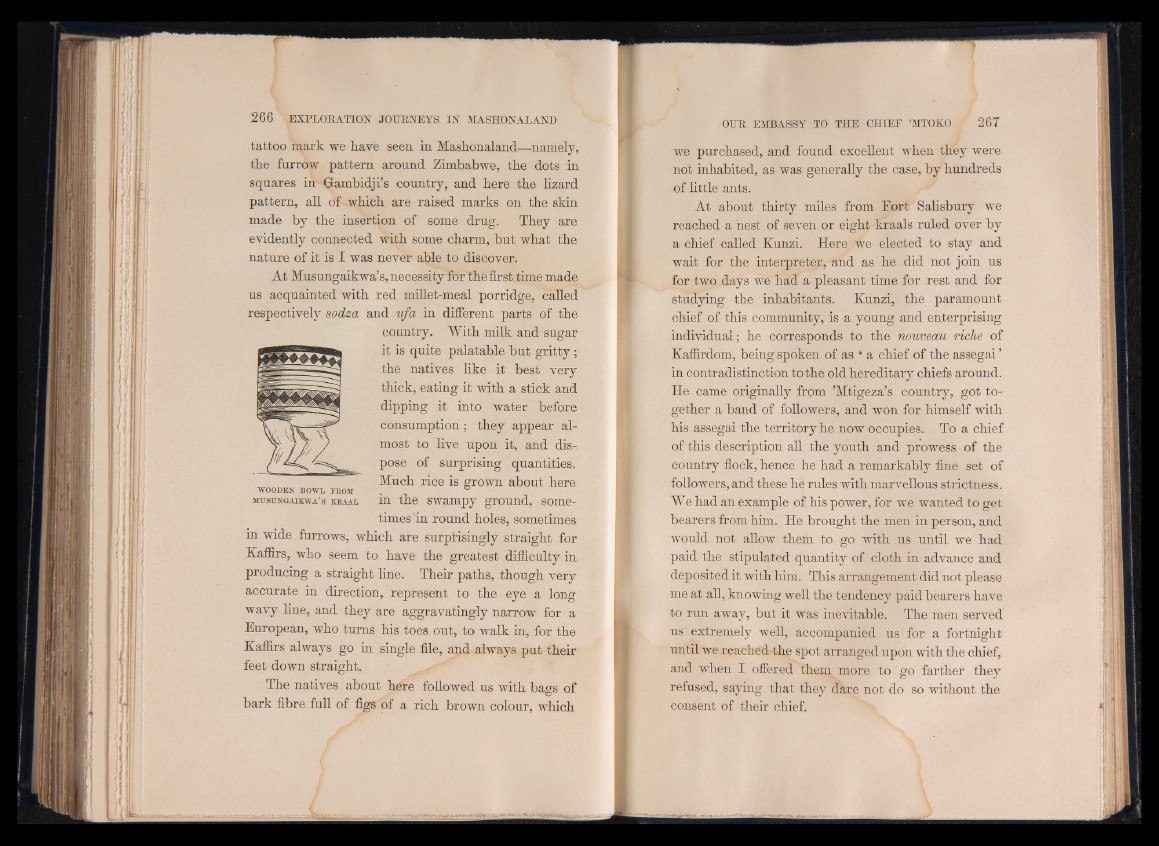
tattoo mark we have seen in Mashonaland—namely,
the furrow pattern around Zimbabwe, the dots in
squares in Gambidji’s country, and here the lizard
pattern, all of which are raised marks on the skin
made by the insertion of some drug. They are
evidently connected with some charm, but what the
nature of it is I was never able to discover.
At Musungaikwa’s, necessity for the first time made
us acquainted with red millet-meal porridge, called
respectively sodza and ufa in different parts of the
country. With milk and sugar
it is quite palatable but gritty ;
the natives like it best very
thick, eating it with a stick and
dipping it into water before
consumption; they appear almost
to live upon it, and dispose
of surprising quantities.
Much rice is grown about here
in the swampy ground, some-
times’ln round holes, sometimes
W O O D EN BOW L FROM
M U SU N G A IKW A ’S KRAAL
in wide furrows, which are surprisingly straight for
Kaffirs, who seem to have the greatest difficulty in
producing a straight fine. Their paths, though very
accurate in direction, represent to the eye a long
wavy fine, and they are aggravatingly narrow for a
European, who turns his toes out, to walk in, for the
Kaffirs always go in single file, and always put their
feet down straight.
The natives about here followed us with bags of
bark fibre full of figs of a rich brown colour, which
we purchased, and found excellent when they were
not inhabited, as was generally the case, by hundreds
of little ants.
At about thirty miles from Fort Salisbury we
reached a nest of seven or eight kraals ruled over by
a chief called Kunzi. Here we elected to stay and
wait for the interpreter, and as he did not join us
for two days we had a pleasant time for rest and for
studying the inhabitants. Kunzi, the paramount
chief of this community, is a young and enterprising
individual; he corresponds to the nouveau riche of
Kaffirdom, being spoken of as ‘ a chief of the assegai ’
in contradistinction to the old hereditary chiefs around.
He came originally from ’Mtigeza’s country, got together
a band of followers, and won for himself with
his assegai the territory he now occupies. To a chief
of this description all the youth and prowess of the
country flock, hence he had a remarkably fine set of
followers, and these he rules with marvellous strictness.
We had an example of his power, for we wanted to get
bearers from him. He brought the men in person, and
would not allow them to go with us until we had
paid the stipulated quantity of cloth in advance and
deposited it with him. This arrangement did not please
me at all, knowing well the tendency paid bearers have
to run away, but it was inevitable. The men served
us extremely well, accompanied us for a fortnight
until we reached the spot arranged upon with the chief,
and when I offered them more to go farther they
refused, saying that they dare not do so without the
consent of their chief.